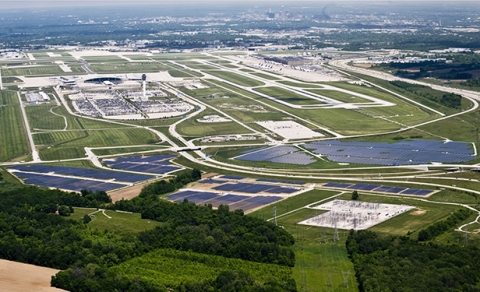Indy Airport Executive Shares Green Airport Practices at UN Sustainability Event

Due to the wide array of sustainability initiatives it has implemented during the years, including the global and national recognition it has received for its sustainability achievements and commitments, the Indianapolis Airport Authority was selected to participate in a panel discussion at the United Nations’ International Civil Aviation Organization Seminar on Green Airports, held Nov. 29 at the UN ICAO headquarters in Montreal, Canada.
Mario Rodriguez, executive director of the Indianapolis Airport Authority, served as a panelist speaker in a discussion centered around green-energy initiatives, during which he focused on the span of ongoing carbon-reducing efforts happening at the Indy Airport (IND), including extensive efforts in renewable and clean energy.
“We have an excellent story to tell the world,” Rodriguez said prior to the event. “Our decisions and efforts are a testament to our commitment to environmental stewardship, and how to integrate that into an airport operation and traveler experience that increases the value of an airport as a public asset.”
The airport’s green achievements began with the construction of a new terminal in 2008, which enabled IND to become the first LEED-certified airport campus in the U.S.
Recently, the Airports Council International-North America’s Airport Carbon Accreditation Program, announced that IND had reached its Level 2 Reduction designation for reducing carbon emissions throughout the airport’s operations. To date, these steps have resulted in emissions reductions equivalent to removing 5,720 vehicles from the road, according to Indy Airport officials.
One of the key topics discussed during the event was solar energy, with Rodriguez sharing a story about the airport’s solar farm initiative, which boasts the largest solar-energy generating operation on airport property in the world. Dubbed IND Solar Farm, the system generates enough electricity to power 3,675 average American homes per year, and was recognized as a significant contribution to Indianapolis being named in the Shining Cities Report from Environment America as well as its achievement of the 2015 Indianapolis Sustainability Award from SustainIndy.
Rodriguez also discussed the airport’s recent launch of the nation’s largest airport electric shuttle bus fleet, which was funded by the largest federal Zero Emissions Grant awarded in 2016, and an additional ZEV grant awarded to the airport this year. The fleet will grow to five buses in January and will expand to a nine-bus fleet in 2019. According to Indy Airport officials, the electric buses reduce IND’s carbon footprint by 15 million pounds.
A range of other sustainable initiatives also was part of Rodriguez’s presentation, including the airport’s BlueIndy electric car-sharing service that was implemented in 2016 that produces no direct carbon emissions, noise pollution or odor, as well as IND’s bee apiary. Established with White Lick Beekeeper’s Association to support community education and beekeeping training to preserve the endangered Indiana honey bee, the apiary earned the airport the 2017 Airports Council International-North America’s Environmental Achievement Award for Outreach, Education and Community Involvement.
“Here at IND, we have chosen to do things in a meaningful way,” Rodriguez said. “Our sustainability efforts are impactful with the largest solar farm complex on any airport in the world, launching the largest all-electric bus fleet in any U.S. airport and being one of the first LEED-certified airport terminal campuses.”
He continued, “It’s important to share IND’s successes with the industry as all communities have similar desires for their public agencies to be good stewards of the environment. The aviation industry can learn from each other, and we’re proud the Indianapolis International Airport has long served as a pilot and launching ground for many programs that were later implemented across America.”
While Rodriguez focused primarily on the larger initiatives at the UN ICAO meeting, IND’s sustainability efforts also include water-bottle refilling stations for passengers traveling through the airport as well as human-powered mobile-device charging bikes that require no electricity usage and help promote fitness.
During his trip, Rodriguez made a point of leaving the UN ICAO event with one clear message: an airport is a tremendous asset to its community and IND connects us to the world and in a world-class way that protects our environment.
“Being a green airport and working to obtain carbon-neutral operations is of the utmost importance,” Rodriguez said.
He continued, “It closely aligns with the Indianapolis Airport Authority’s mission to increase public value. The Indianapolis International Airport is a public entity that exists to serve its community. A strategic win is aligning with the community’s goals and desires. The greater Indianapolis community, similar to most communities worldwide, desires public agencies to be good stewards of the environment. Becoming an environmental leader in the U.S. is a positive byproduct of doing what is best for the community.”
Along with Rodriguez, representatives from airports including the San Diego International Airport; the San Francisco International Airport; Aéroports de Paris; Greater Toronto Airports Authority; Airports of Thailand; Federal Aviation Administration; Airports Council International – World and the U.S. Green Building Council also participated in the event.
According to Rodriguez, IND’s presentation was well received.
“By presenting the tangible benefits of these efforts on the local community, via reduction of the airport’s carbon footprint, it helped to set the stage to discuss the deeper issue of return on investment for these programs,” Rodriguez explained.
He continued, “ROI should not be a simplistic financial equation but rather an all-encompassing public value equation. It is easy to opt for the cheaper, less environmentally sound practice, but this degrades the environment and thus reduces public value. Sustainability remains one of the fundamental goals of the Indianapolis Airport Authority; we take great pride in this accomplishment and hope it sends a clear signal to other airports throughout North America that sustainability and good business practice can often fit hand-in-hand.”


Add new comment